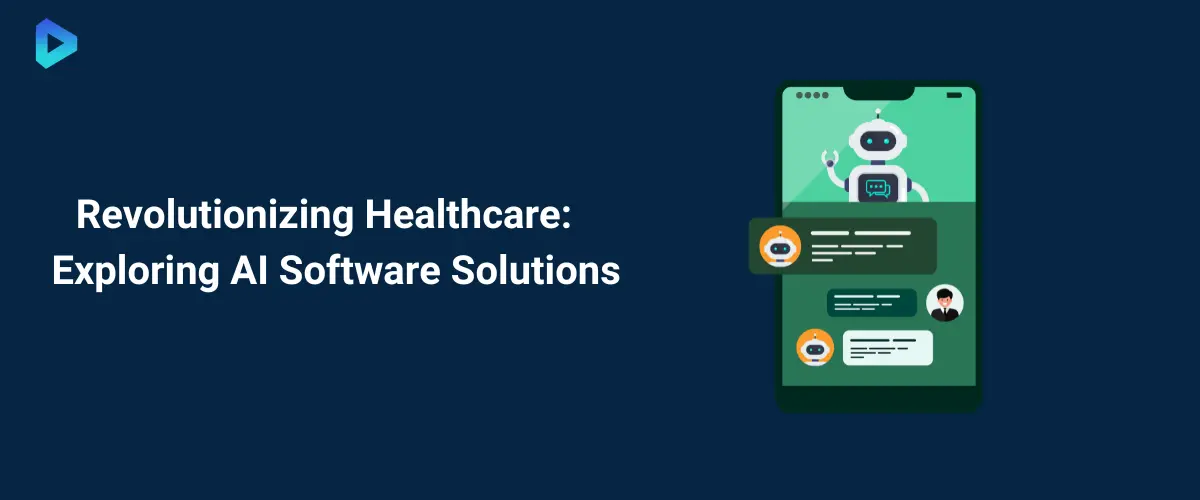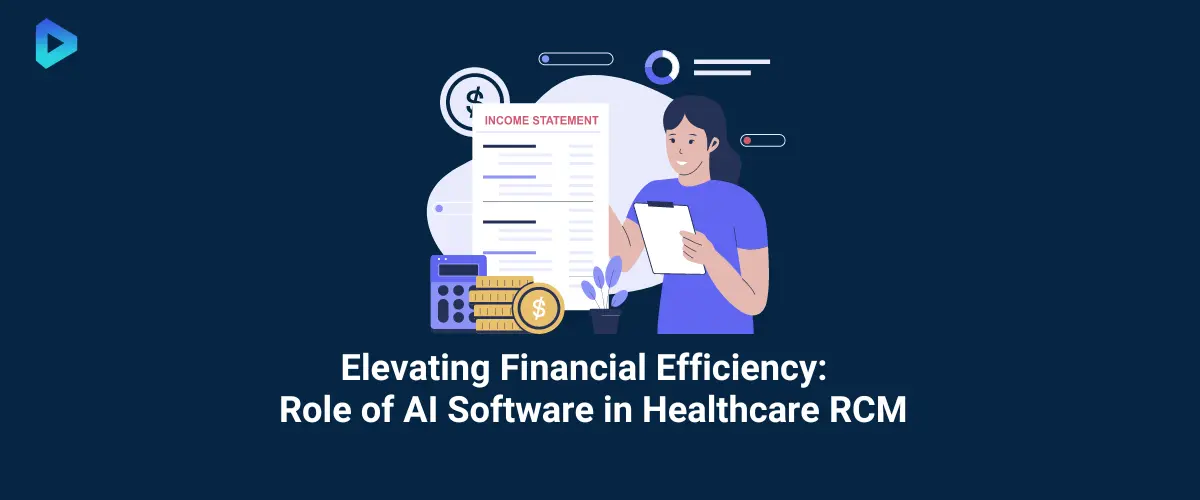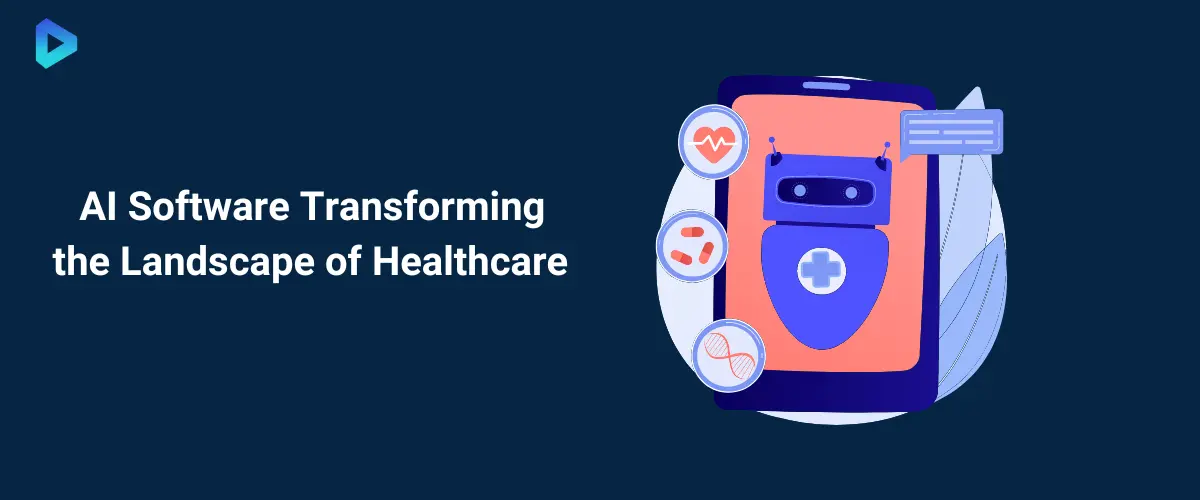Brief Overview of AI in Healthcare
Understanding Healthcare AI Software
 Explanation of AI Software Tailored for Healthcare
Explanation of AI Software Tailored for HealthcareBenefits of Healthcare AI Software

In the domain of diagnosis, AI enhances the precision and efficiency of medical assessments. AI helps doctors spot early signs of diseases by analyzing X-rays and slides for subtle anomalies. This results in faster and more accurate diagnoses, enabling timely interventions and treatment planning.
The integration of AI into healthcare thus stands as a transformative force, promising a future where diagnoses are more precise, treatments more personalized, and overall patient outcomes significantly improved. As technology continues to evolve, the benefits of healthcare AI software are poised to transform medical practices and redefine standards of care on a global scale.
Furthermore, AI contributes to the digitalization and organization of patient records, making data retrieval faster and more accurate. AI in Electronic Health Record (EHR) systems helps manage data better, reducing errors compared to manual record-keeping.
Healthcare AI Software Solutions
 Overview of Available AI Software Solutions in Healthcare
Overview of Available AI Software Solutions in Healthcare
These solutions leverage artificial intelligence to enhance diagnostics, treatment planning, and overall healthcare delivery.
- Diagnostic Imaging Software: AI helps analyze X-rays, MRIs, and CT scans, improving diagnostic accuracy in medical imaging. These applications assist healthcare professionals in detecting anomalies and providing rapid, accurate diagnoses.
- Predictive Analytics Platforms: These solutions leverage machine learning algorithms to analyze patient data and identify patterns indicative of potential health issues. Predictive analytics aids in forecasting disease trends, enabling healthcare providers to implement preventive measures and personalized interventions.
- Personalized Medicine Platforms: AI plays a crucial role in tailoring treatment plans based on individual patient characteristics. By analyzing genetic and clinical data, these platforms optimize treatment efficacy while minimizing adverse effects, ushering in a new era of precision medicine.
- Administrative Automation Tools: AI solutions streamline administrative tasks, including appointment scheduling, billing, and record-keeping. Automation in these areas enhances operational efficiency, reduces errors, and allows healthcare professionals to focus on direct patient care.
- Natural Language Processing (NLP) Applications: NLP-powered solutions extract important information from messy clinical notes. This helps analyze large amounts of text data and enhances our understanding of patient records.
Comparison between Different Software Options
Navigating the landscape of healthcare AI software solutions requires a nuanced understanding of the distinct features and functionalities offered by various platforms. A comparative analysis helps healthcare professionals understand the strengths of different options. This allows them to make informed decisions tailored to their specific needs.
- Diagnostic Precision: Some solutions excel in diagnostic imaging, leveraging advanced algorithms for accurate interpretation of medical images. Understanding how each platform diagnoses is important for choosing tools that meet the healthcare facility's diagnostic needs.
- Predictive Analytics: Variations exist in the predictive analytics capabilities of different platforms. Some may specialize in forecasting disease trends, while others emphasize personalized risk assessments. Evaluating the predictive power and flexibility of each solution ensures a strategic fit with the healthcare provider's goals.
- Personalized Medicine Integration: Platforms focusing on personalized medicine utilize AI to tailor treatment plans based on individual patient data. The extent to which a solution incorporates genetic analysis and clinical information influences its effectiveness in delivering personalized and targeted healthcare interventions.
- Administrative Efficiency: The comparison should include the degree of automation and efficiency each solution brings to administrative tasks. The ability to streamline appointment scheduling, billing processes, and record-keeping varies among different software options, impacting overall operational efficiency.
- Compatibility and Integration: Assessing how well a healthcare AI software solution integrates with existing systems and ensures compatibility is crucial. Seamless integration enhances data flow and communication across different departments, fostering a cohesive healthcare ecosystem.
Case Studies Highlighting Successful Implementation
These case studies provide clear examples of how AI is positively affecting different aspects of healthcare delivery:
- Diagnostic Advancements: A case study might show how a hospital improved diagnoses by adopting AI-powered imaging software, making them faster and more accurate. The implementation could lead to improved patient outcomes, reduced diagnostic errors, and enhanced collaboration among healthcare professionals.
- Predictive Analytics Success: Another case study might spotlight a healthcare institution that effectively utilized predictive analytics to identify high-risk patients and implement preventive interventions. The institution used AI algorithms to reduce emergency admissions and proactively manage chronic diseases.
- Personalized Treatment: A case study focusing on personalized medicine platforms could highlight a clinic's implementation of AI to tailor treatment plans based on individual patient data. The outcomes may include improved treatment efficacy, minimized adverse effects, and increased patient satisfaction.
- Operational Efficiency: Successful case studies in administrative automation may illustrate how AI streamlines appointment scheduling, billing processes, and record-keeping. Such implementations could lead to a more efficient workflow, reduced administrative burdens, and increased time for direct patient care.
AI Software for Healthcare Revenue Cycle Management
 Role of AI in revenue cycle management (RCM) within healthcare
Role of AI in revenue cycle management (RCM) within healthcare
AI plays a diverse role in streamlining the revenue cycle, encompassing various stages from patient registration to reimbursement.
- Automated Coding and Documentation: AI algorithms can analyze medical documentation to accurately code procedures and diagnoses. This not only reduces manual errors but also accelerates the billing process, ensuring accurate and timely reimbursement.
- Claim Denial Prediction and Prevention: AI-driven predictive analytics assess historical claims data to identify patterns indicative of potential denials. AI identifies potential issues before submitting claims, preventing denials, reducing revenue loss, and enabling a proactive billing approach.
- Patient Eligibility Verification: AI facilitates real-time verification of patient insurance eligibility. By quickly confirming coverage and detecting issues like lapsed policies, healthcare providers can prevent billing errors and streamline the registration process.
- Optimizing Charge Capture: AI algorithms analyze patient records and clinical documentation to ensure that all billable services are accurately captured. This optimization ensures that healthcare organizations receive appropriate reimbursement for the services provided.
- Enhanced Revenue Forecasting: AI analytics give healthcare organizations information about revenue trends, helping them make well-informed decisions. This proactive approach aids in financial planning, budgeting, and optimizing resource allocation.
Efficiency Improvements in Billing, Coding, and Claims Management
Integrating AI into Healthcare Revenue Cycle Management (RCM) significantly improves critical processes like billing, coding, and claims management. AI algorithms automate and optimize financial operations, making them more accurate and streamlined in healthcare organizations.
Automated coding powered by AI ensures precision and speed in translating medical documentation into billing codes. This not only reduces the likelihood of coding errors but also accelerates the coding process, enabling faster billing cycles. In claims management, AI uses past data to find patterns and potential issues that might lead to denials. Being proactive, healthcare providers fix issues before submitting claims, reducing denials and ensuring a smoother reimbursement process.
Moreover, AI contributes to efficiency improvements in billing processes by automating repetitive tasks and optimizing charge capture. The technology analyzes patient records to ensure all billable services are accurately recorded, enhancing the revenue capture for healthcare services provided. AI improves accuracy and efficiency in billing, coding, and claims management, strengthening the healthcare revenue cycle.
Impact on Financial Aspects of Healthcare Organizations
Implementing AI in Healthcare Revenue Cycle Management significantly benefits healthcare organizations, positively impacting revenue generation and financial sustainability. By automating critical processes such as billing, coding, and claims management, AI significantly improves accuracy and efficiency, leading to tangible financial outcomes.
AI automates coding, ensuring accuracy and speed in translating medical documentation into billing codes. This reduces errors and speeds up the billing process. This efficiency directly contributes to faster reimbursement cycles, optimizing the cash flow for healthcare providers. Moreover, in claims management, AI's predictive analytics capabilities identify patterns and potential issues, allowing organizations to proactively address challenges before submitting claims. This proactive approach minimizes claim denials, reduces revenue loss, and promotes a more stable financial environment.
Furthermore, AI enhances charge capture optimization by analyzing patient records, ensuring all billable services are accurately recorded. This not only improves reimbursement accuracy but also maximizes revenue capture for the healthcare services delivered. AI in Healthcare RCM improves efficiency and transforms the financial health of organizations, creating a more resilient ecosystem.
Healthcare Company AI Software Solutions
 Companies Leading in Providing AI Solutions for Healthcare
Companies Leading in Providing AI Solutions for Healthcare
Several innovative companies are leading the way in transforming healthcare by providing cutting-edge AI solutions.
- IBM Watson Health: IBM is a pioneer in healthcare AI, particularly with its Watson Health platform. It offers solutions for data analytics, clinical decision support, and personalized medicine, empowering healthcare professionals with actionable insights from vast datasets.
- Google Health: Google is advancing healthcare AI using its knowledge in data analytics and machine learning. Google Health's projects include using AI for medical imaging analysis, disease prediction, and improving health data compatibility.
- Siemens Healthineers: A global leader in medical technology, integrates AI into its diagnostic imaging solutions. Their AI-powered systems enhance the accuracy and efficiency of medical imaging, aiding in faster and more precise diagnostics.
- Cerner Corporation: Cerner, a leader in health technology, uses AI to streamline clinical workflows, manage data effectively, and improve patient outcomes. Their solutions focus on seamlessly integrating AI into existing healthcare systems.
- Digiprima Technology: Digiprima Technology contributes to healthcare AI with innovative solutions that improve data management, engage patients, and enhance healthcare analytics. Their focus on technological advancements aligns with the evolving needs of the healthcare industry.
Profiles and Offerings of Prominent Healthcare AI Software Companies
In healthcare AI, several leading companies are making significant contributions to the integration of artificial intelligence.
- IBM Watson Health: IBM's Watson Health platform leads in data analytics, clinical decision support, and personalized medicine solutions. The Watson Health platform by IBM empowers healthcare professionals with AI, helping with better decision-making and improving patient outcomes.
- Google Health: Google Health uses data analytics and machine learning for projects in medical imaging analysis, disease prediction, and improving health data compatibility. Their initiatives aim to transform diagnostics and bolster predictive healthcare capabilities.
- Siemens Healthineers: As a global leader in medical technology, Siemens Healthineers integrates AI into diagnostic imaging solutions. Their AI-powered systems enhance the accuracy and efficiency of medical imaging, contributing to faster and more precise diagnostics and ultimately improving patient care.
- Cerner Corporation: Cerner is a major player in health technology. They use AI to improve how things work for doctors, manage data more efficiently, and make sure patients get better care. Their solutions seamlessly integrate AI into existing healthcare systems, fostering operational efficiency and improved patient care delivery.
- Digiprima Technology: Emerging as a significant player, Digiprima Technology offers innovative solutions focusing on data management, patient engagement, and healthcare analytics. Their contributions align with the evolving needs of the healthcare industry. They are actively participating in the digital transformation of healthcare processes.
Customer Success Stories and Testimonials
Exploring success stories and testimonials shows how healthcare AI software companies really make a difference in the real world. These stories shed light on the tangible benefits experienced by healthcare institutions.
- IBM Watson Health: Customers may share how Watson Health's tools help healthcare teams make better decisions. Success stories could showcase improved patient outcomes, streamlined workflows, and enhanced diagnostic accuracy.
- Google Health: Real-world examples could illustrate how Google Health's AI initiatives in medical imaging analysis have transformed diagnostic processes. Success stories might feature instances of early disease detection, leading to timely interventions and improved patient prognoses.
- Siemens Healthineers: Customer success stories could emphasize the impact of Siemens Healthineers' AI-powered diagnostic imaging solutions. These narratives might showcase faster and more accurate diagnostics, resulting in enhanced patient care and satisfaction.
- Cerner Corporation: Testimonials from healthcare providers could highlight the positive outcomes of integrating Cerner's AI solutions into clinical workflows. Success stories may focus on improved data management, increased operational efficiency, and better patient engagement.
- Digiprima Technology: Emerging success stories from Digiprima Technology could underscore the positive impact of their solutions on data management and healthcare analytics. Customer testimonials might highlight improved insights, streamlined processes, and enhanced patient outcomes.
How to Maintain Confidentiality in AI Healthcare Software
 Importance of Data Privacy in Healthcare AI
Importance of Data Privacy in Healthcare AI
In AI healthcare software, keeping data private is crucial, highlighting the importance of confidentiality in handling information. Healthcare AI processes sensitive patient data, including medical histories and diagnostics. Protecting this information is a basic ethical and legal responsibility.
- Access Controls: Implementing stringent access controls is fundamental. This involves defining and enforcing permissions to limit system access only to authorized personnel. Role-based access ensures that individuals have appropriate levels of access based on their responsibilities within the healthcare organization.
- End-to-End Encryption: Employing end-to-end encryption is essential for protecting data during transmission. This cryptographic technique securely encodes information at the source. The intended recipient decrypts it, safeguarding patient data from interception by unauthorized entities.
- Data Masking and Anonymization: To further enhance privacy, IT administrators can mask or anonymize sensitive information in non-production environments. This technique ensures that realistic data is used for testing and development without compromising the privacy of individual patients.
- Regular Audits and Monitoring: Continuous monitoring of system activities and regular audits are crucial. These measures help detect any unusual patterns or potential security breaches promptly. Proactive monitoring is essential for identifying and addressing security weaknesses in real-time.
- Secure Data Storage: Utilizing secure and compliant data storage solutions is imperative. Cloud-based storage platforms employ advanced encryption mechanisms to provide an additional layer of protection. This ensures that stored data remains confidential and tamper-proof.
- HIPAA (Health Insurance Portability and Accountability Act): Adherence to HIPAA regulations is paramount. This U.S. legislation mandates the safeguarding of protected health information (PHI). AI healthcare software must comply with HIPAA's stringent requirements, encompassing data security, access controls, and audit trails to protect patient privacy.
- GDPR (General Data Protection Regulation): For organizations operating in the European Union, compliance with GDPR is essential. GDPR prioritizes individuals' privacy rights, requiring explicit consent for data processing, transparent data practices, and strong security measures to prevent unauthorized access.
- ISO/IEC 27001: Following the ISO/IEC 27001 standard ensures a comprehensive approach to information security management. This globally accepted standard establishes a framework for implementing and maintaining an information security management system. It includes measures to safeguard healthcare data and prevent unauthorized disclosure.
- HITECH Act (Health Information Technology for Economic and Clinical Health): Complying with the HITECH Act is crucial for organizations handling electronic health records (EHRs). The Act strengthens HIPAA regulations, emphasizing the secure exchange of health information and imposing penalties for data breaches.
- National and Regional Standards: Depending on the geographic location, healthcare organizations must align with national and regional standards governing data protection and privacy. Following these standards ensures that AI healthcare software meets the specific requirements of the healthcare environment.
Conclusion




Leave your thought
Send us a Message
Contact Info
inquiry@digiprima.com
ashesh@digiprima.com
+91-62661-63663
hr@digiprima.com